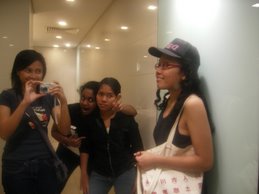Being involved in a few online communities myself, i seldom face any difficulties in maintaining privacy mostly because the anonymous setting allows me to reserve the right to self revelation. On the other hand, i find myself wanting to reveal a little bit more so as to get accepted. As what Rosen (2004) has mentioned in his article 'The Naked Crowd', trustworthiness and intimacy are achieved through revealing details of one's personal lives. With the advent of blogs and personal websites, one can easily know about another person daily lives and activities. Getting more personal online, people believe that they are being heard and recognized. There is an innate desire to be known to everyone. The line between privacy and self exposure is a blur now.
People need to understand that there are certain information that are appropriate to reveal to friends which are not appropriate to reveal to the world. For example I would prefer to let people know details of myself that are relevant to which community I am in. I feel it is unnecessary to disclose personal information such as my daily activities, marital status or income. In an article written by Gary Marx (2004), we need both liberty and order, a little bit of privacy and anonymity. He also mentioned that being anonymity can hide dastardly details and visibility can prove accountability. But, too much visibility can hinder freedom of expression, creativity and risk-taking. I strongly agree in his point of view, which i think is especially applicable in a Singapore context. Unlike the Americans, Singaporeans are a more reticent group of people. While Americans are anxious in creating an identity and joining the Naked Crowd, we value privacy a little bit more. There is no doubt however that we are also moving in the graphomania stage where there is a longing to express ourselves in writing before unknown readers (Rosen, J. 2004). But again, we have to consider the risks that might be involved if we disclose too much. Privacy needs to be taken into account no matter how much we want to be included in society. Trading privacy for the 'illusion' of being accepted may not be worth it in the long run.
Reference
Marx, G,T. (2004). Surveillance and society. Encyclopedia of Social Theory. Retrieved March 8, 2007, from http://web.mit.edu/gtmarx/www/surandsoc.html
Rosen, J. (2004). The Naked Crowd. Retrieved March 8, 2007, from http://www.spiked-online.com/Printable/0000000CA5FF.htm
Sullivan, B. (2006). Privacy Lost: Does Anybody Care?. Retrieved March 8, 2007, from http://www.msnbc.msn.com/id/15221095/print/1/displaymode/1098/
Rosen, J. (2004). The Naked Crowd. Retrieved March 8, 2007, from http://www.spiked-online.com/Printable/0000000CA5FF.htm
Sullivan, B. (2006). Privacy Lost: Does Anybody Care?. Retrieved March 8, 2007, from http://www.msnbc.msn.com/id/15221095/print/1/displaymode/1098/

No comments:
Post a Comment